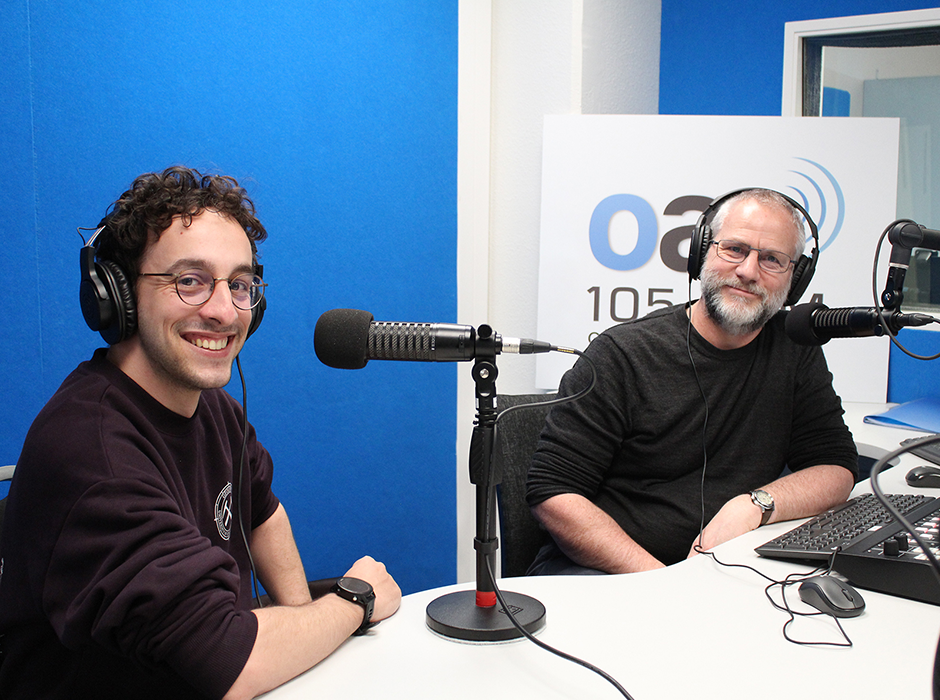
Dr Dave McMorran (right) interviews Geology PhD student Julien Eschenroeder for his 266th Science Notes show at Otago Access Radio (credit: Dom Angelo-Laloli).
Dr Dave McMorran has just recorded his 266th podcast which features Geology PhD student Julien Eschenroeder talking about his research on the historical effects of climate on remote lakes in Fiordland.
Since 2010, the Senior Teaching Fellow in Chemistry has been talking with postgraduate students across the Sciences for his Science Notes show broadcast on Otago Access Radio (OAR).
Dave has a gift for teaching and supporting students through their learning journeys at Otago. In addition to two OUSA teaching awards, he won the 2016 Division of Sciences Senior Teacher of the Year award. In 2019, Dave was also recognised with an Ako Aotearoa National Teaching Excellence Awards for Sustained Excellence in Tertiary Teaching.
With 26 years of teaching experience at Otago, Dave says he’s always been conscious that supporting students should go beyond the classroom, and the podcasts have offered another opportunity for students to grow their skills.
With two OAR Achievement Awards and 266 shows under his belt, Guy Frederick caught up with Dave to ask a few questions of this podcast expert.
How did you come up with the idea for the podcast in 2010?
I first became aware of Otago Access Radio (or Toroa Radio as it was then called) when my wife became involved in a show. The station seemed to have no shows on science. At the time I was chair of the Division of Sciences Outreach Committee and so I was interested in developing new ways to promote science and the work going on in the Division. With so many PhD and MSc students doing cool stuff, it seemed a good idea to start a show to profile them and their research.
Are there any particularly memorable podcasts for you?
An early guest talked about studying the eating habits of native frogs, which involved her catching the frogs in the wild and keeping them in zip lock bags for a night so she could collect their poop. Another time I had a chemistry student talking about her research into making better dishwasher detergents. Her wee boy sat on her lap with headphones on while we recorded the podcast.
One guest talked about how she was using textile science to understand how to make a better sock. And another show featured two students from the Chemistry department, who talked about their experiences of doing chemistry outreach in the jungles of Malaysia.
I also have a tradition of preparing a Christmas show where, rather than talking to a student, I talk about something ‘Christmasy’. One favourite show was entitled ‘On the possibility of a bioluminescent reindeer’.
What have you learned from these shows as an interviewer?
Students can be quite nervous when they come into the studio, and I seem to be quite good at putting people at ease and getting them to discuss their research in a way that’s accessible to the listener. With a little homework I’m normally able to understand the basics of what the guests are researching. If they can explain things to me so I can understand it, then I think they’re doing so at the right level for the listeners. That said, I do have to be a bit more careful when I am talking to a student from Chemistry!
Personally, I find it really interesting meeting the students and finding out what they do – in talking with them I have learned a lot. What has remained constant over the years is that there are always students who are passionate about the research they are doing.
266 shows and counting is impressive – what keeps you motivated to produce them?
The podcast is a great way for students to get experience talking about their research in a different way to what they might do in their departments or at a conference - they need to speak to a different audience, and they also need to speak without pictures. It is great for the listeners as they get a chance to hear what’s happening across the University from the people doing the research, rather than the person running the group. I also think it’s a good way for school kids who are thinking about science as a career to find out what doing postgraduate research is like.
How do the podcasts benefit students?
Something I have always felt strongly is that, if a postgraduate student is wanting to become an academic, then their research abilities are only part of the required skill set. Communication skills should be just as important and the podcast provides a different way for them to think about how to communicate.
What role does music play in your podcasts?
I ask guests to bring along a piece of music to play because it helps the listener understand them better. In the same way, we always start each podcast with guests talking about their backgrounds and what led them to where they are now. The students are more than just their research.
How do you find students for the podcasts?
I am happy to have any and all science students on the show. If you have an interesting story to tell about your research and are able to talk about the ‘why’ of your work as much as the ‘what’, then get in touch.
Dave would like to acknowledge the support of the Division of Sciences and the encouragement of the staff at OAR over the years.
Science Notes podcast is available on Spotify, Apple Podcasts and OAR FM.